Ashwagandha is one of the most widely used plants in Ayurvedic medicine due to its adaptogenic properties. Also known as Withania somnifera or “Indian ginseng,” has become popular in recent years thanks to its ability to help the body adapt to stress and improve physical and mental balance.
But what exactly is ashwagandha? What benefits does it have for men and women? When should it be taken, and what are its contraindications? In this article, we will discuss its main uses, properties, and how to incorporate it into your daily routine.
Table of contents
What is ashwagandha and what is it used for?
Theashwagandha It is a plant native to India and Africa, used for centuries in Ayurvedic medicine as a natural tonic. Its root contains active compounds called withanolides, which give it its adaptogenic effect: that is, it helps the body to better manage physical, mental, and emotional stress, promoting balance.
Among its main uses are:
Improve resistance to stress and fatigue.
Promote relaxation and rest.
Support cognitive function and memory.
Contribute to hormonal balance and vitality.
Properties and benefits of ashwagandha
1. Reduction of stress and anxiety
Thanks to its ability to regulate levels of cortisol, the stress hormone, ashwagandha helps promote a sense of calm without causing sedation.
2. Improved energy and vitality
Although it is known for its calming effect, it also increases physical and mental endurance , helping to maintain energy throughout the day.
3. Supports memory and concentration
Ashwagandha promotes cognitive function, helping to improve mental clarity and concentration, especially during times of high workload or study.
4. Benefits for women
It can be useful in cases of menopausal symptoms, helping to regulate mood swings and improve nighttime rest.
5. Benefits for men
Some studies suggest that it contributes to improving vitality, physical endurance, and overall well-being.
What is the best ashwagandha and how should it be taken?
To reap its benefits, it is important to choose extracts standardized in withanolides, the plant's main active ingredient.
The most common dose ranges from 300 mg to 600 mg daily, divided into one or two doses.
At ZZEN Labs, we have developed our own formula with experts, containing:
Ashwagandha KSM-66 ® (550 mg)
Saffron dry extract (30 mg)
When is the best time to take ashwagandha?
It depends on what you want to achieve with this:
If you are looking to relax or even promote sleep, it is best to take it at night, about 30-60 minutes before bedtime.
Also, if you are looking for a boost of energy and vitality in your daily routine, include it in your morning routine, along with breakfast.
Main mistake when taking Ashwagandha
Ashwagandha modulates receptors, and like any modulator, it needs breaks. And taking it forever won't give you better results; in fact, the opposite is true.
The smart protocol for taking ashwagandha is:
8-12 weeks of use
1 week off
Repeat cycle
Because without recovery, there is no adaptation.
Opinions about ashwagandha
The vast majority of people who try ashwagandha report that, after a few weeks of use, they notice:
Reduced feelings of stress.
Deeper, more restful sleep.
Greater mental clarity and emotional stability.
However, its effects are not immediate: its impact is progressive and depends on consistency and accompanying it with good habits. You can also complement it with supplements for concentration and energy such as ZZEN Focus or sleep suplemment if you want to promote restful sleep.
Conclusion
Ashwagandha is not a miracle cure, but it is a natural ally with real effects backed by science. It can help you manage stress, improve your rest, boost your energy, and promote greater emotional and physical balance.
If you are looking for a high-quality, pure formula with the right concentration of active ingredients, discover how ZZEN Calm Ashwagandha can accompany you in your daily life.









Leave a comment
This site is protected by hCaptcha and the hCaptcha Privacy Policy and Terms of Service apply.